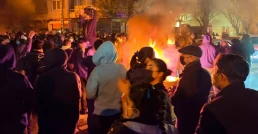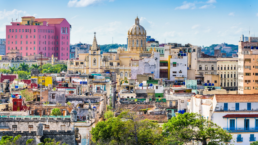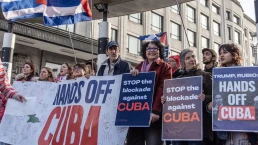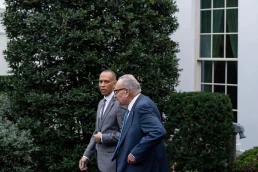“I hope that the world will not be misled that Israel is now ready to open a different kind of page in its relationship with the Palestinians.”
By Ilan Pappé and Amy Goodman, Democracy Now!
Renowned Israeli historian, author and professor Ilan Pappé discusses the postwar prospects of Palestinian statehood and of Israeli Prime Minister Benjamin Netanyahu, who is under investigation for corruption in Israel and subject to an international arrest warrant from the International Criminal Court. Despite the newly implemented Gaza ceasefire, says Pappé, Israeli political leaders have not changed their policy aim to ethnically cleanse Palestinians from their remaining territory. “Nothing has changed in the dehumanization and the attitude of this particular Israeli government and its belief that it has the power to wipe out Palestine as a nation, as a people and as a country,” he explains. Pappé’s latest book is titled Israel on the Brink: And the Eight Revolutions That Could Lead to Decolonization and Coexistence.
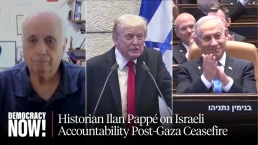
Transcript
This is a rush transcript. Copy may not be in its final form.
AMY GOODMAN: This is Democracy Now!, democracynow.org, The War and Peace Report. I’m Amy Goodman.
As we’ve reported, the Gaza ceasefire deal is in effect. Phase one of the U.S.-backed 20-point plan is underway. Hamas has released all 20 living captives, hostages. Israel is releasing some 2,000 Palestinians in Ramallah and now in Khan Younis in Gaza.
Today, President Trump addressed the Israeli Knesset and then is on his way to co-chair a so-called peace summit in Sharm el-Sheikh, Egypt, with President Abdel Fattah el-Sisi. Israeli Prime Minister Netanyahu will not be among the 27 or more world leaders who will attend. He was invited but says he is not going.
For more, we’re joined by the Israeli historian, author and professor Ilan Pappé, professor of history and director of the European Centre for Palestine Studies at the University of Exeter and the chair of the Nakba Memorial Foundation. Among his books, The Ethnic Cleansing of Palestine, almost 20 years ago, and Gaza in Crisis, which he co-wrote with Noam Chomsky. His new book, Israel on the Brink: And the Eight Revolutions That Could Lead to Decolonization and Coexistence.
We thank you so much for being with us. Professor Pappé, if you could start off by responding to what has happened? We’re watching, in Khan Younis, prisoners being released, Palestinian prisoners, up to 2,000, and in the occupied West Bank, though there families were told if they dare celebrate the release of their loved ones, they might be arrested. And we saw the release of the 20 Israeli hostages as they return to Israel. Hamas says they’re returning the dead hostages, the remains, over the next few days. Israel has not said they will return the dead prisoners, of which it’s believed there are nearly 200 in Israeli prisons. Your response overall, and now to the summit in Egypt?
ILAN PAPPÉ: Yes. First of all, there is some joy in knowing that the bombing of the people in Gaza has stopped for a while. And there is joy knowing that Palestinian political prisoners have been reunited with their families, and, similarly, that Israeli hostages were reunited with their families.
But except from that, I don’t think we are in such an historical moment as President Trump claimed in his speech in the Knesset and beforehand. We are not at the end of the terrible chapter that we have been in it for the last two years. And that chapter is an Israeli attempt by a particularly fanatic, extremely right-wing Israeli government to try and use ethnic cleansing in the West Bank and genocide in Gaza to downsize the number of Palestinians in Palestine and impose Israel’s will in a way that they hope would be at least endorsed by some Arab governments and the world. And so far, they have an alliance of Trump and some extreme right-wing parties in Europe.
And now I hope that the world will not be misled that Israel is now ready to open a different kind of page in its relationship with the Palestinians. And what you told us about the way that the celebrations were dealt with in the West Bank and the incineration of the sanitation center shows you that nothing has changed in the dehumanization and the attitude of this particular Israeli government and its belief that it has the power to wipe out Palestine as a nation, as a people and as a country. And I hope the world will not stand by, because up to now it did stand by when the genocide occurred in Palestine.
AMY GOODMAN: We have just heard President Trump’s address to the Israeli Knesset. He followed the Israeli prime minister, Netanyahu. I’m not sure, but in listening to Netanyahu, I don’t think he used the word “Palestinian.” President Trump has just called on the Israeli president to pardon Netanyahu. Your thoughts on this, and also the possibility of why Netanyahu has not joined this summit that President Trump will be co-chairing? Many are speculating for different reasons — didn’t want to anger the right, that’s further right than him. Others are saying the possibility of his arrest, not on corruption charges, but on crimes against humanity, the whole case before the International Criminal Court.
ILAN PAPPÉ: It could be a mixture of all of it, but I think at the center of it is the nature of the Israeli government that was elected in November 2022, this alliance between a very opportunistic politician, who’s only interested in surviving and keeping his position as a prime minister, alongside messianic, neo-Zionist politicians who really believe that God has given them the opportunity to create the Greater Israel, maybe even beyond the borders of Palestine, and, in the process, eliminate Palestinians. I think that his consideration should all — are always about his chances of survival. So, whatever went in his mind, he came to the conclusion that going to Cairo is not going to help his chances of being reelected.
My great worry is not that he didn’t go to Cairo. My greatest worry is that he does believe that his only chance of being reelected is still to have a war going on, either in Gaza or in the West Bank or against Iran or in the north with Lebanon. We are dealing here with a reckless, irresponsible politician, who is even willing to drown his own state in the process of saving his skin and his neck. And the victims will always be, from this adventurous policy, the Palestinians.
I hope the world understands that, really, the urgent need of — and I’m talking about world leaders rather than societies. You already discussed with Ahmed how — what is the level of solidarity among civil societies. But I do hope that political elites will understand their — especially in the West, their role now is not to mediate between Israelis and Palestinians. Their role now is to protect the Palestinians from destruction, elimination, genocide and ethnic cleansing. And nothing of that duty, especially of Europe, that is complicit with what happened, and the United States, that are complicit with what happened in the last two years — nothing that we heard in the speeches so far in the — in preparation for the summit in Egypt, and I have a feeling that we won’t hear anything about it also later on. There is a different way in which our civil societies refer to Palestine as a place that has to be saved and protected, and still this irrelevant conversation about our political elites about a peace deal, a two-state solution, all of that, that has nothing to do with what we are experiencing in the way that the Israeli government thinks it has an historical moment to totally de-Arabize Palestine and eliminate and expunge the Palestinians from history and the area.
AMY GOODMAN: Ilan Pappé, I want to thank you for being with us, Israeli historian, professor of history, director of the European Centre for Palestine Studies at the University of Exeter, chair of the Nakba Memorial Foundation. His new book, Israel on the Brink: And the Eight Revolutions That Could Lead to Decolonization and Coexistence.
Recent Posts
Leading Papers Call For Destroying Iran To Save It
February 11, 2026
Take Action Now The opinion pages of the New York Times and Washington Post are offering facile humanitarian arguments for the US to escalate its…
Despite Marco Rubio’s Warnings, This is the Time to Go to Cuba in Solidarity Against the Latest U.S. Aggressions
February 10, 2026
Take Action Now When visiting Cuba, one can see quickly the terrible effects of the almost seven decades of the U.S. economic blockade of Cuba.By…
“Hands Off Cuba!”: Left Groups in Europe Mobilize Against U.S. Aggression
February 10, 2026
Take Action Now Hundreds demonstrated in Belgium in solidarity with Cuba as further mobilizations against US imperialism are planned across Europe.……
Democrats Propose Minor Reforms for ICE — and Record Funding
February 10, 2026
Take Action Now Congressional Democratic leaders are asking ICE to agree to reforms, promising to vote for $11 billion in funding for the agency if…

